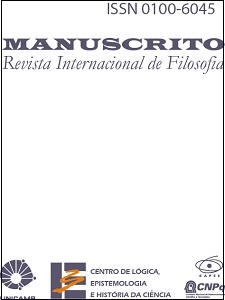Resumo
O objetivo deste trabalho é demonstrar que os estudos de antropologia de Kant não constituem um agregado de elementos isolados senão que respondem a uma ordem sistemática de conhecimento estabelecido pelo plano da filosofia transcendental. Isso significa que a Antropologia está definida por um objeto (o homem) sobre o qual se aplicam (de acordo com um método) um conjunto de predicados segundo a ordem das capacidades, temperamentos e disposições. Porém, isto se faz a partir da possibilidade de uma proposição sintética a priori fundamental, a saber: “o homem é cidadão do mundo”. Essa predicação conforma outras proposições sintéticas. Ditas proposições possuem características sui generis. Não são apenas predicações sobre objetos empíricos, mas não desconhecem as particularidades das observações da experiência; não referem diretamente à lei moral, mas não a desconhecem na constituição de seu objeto. Assim sendo, aqui se propõe uma interpretação sistemática do lugar, definição, divisão, objeto e método da Antropologia. Para poder chegar a isto, primeiro, avaliaremos a literatura secundária sobre o tema, segundo, formularemos com especificidade nosso problema e, terceiro, desenvolveremos a solução.
Abstract:
The objective of this paper is to demonstrate that Kant’s studies of anthropology are not an aggregate of isolated elements but rather that they correspond to a systematic order of knowledge established by the project of transcendental philosophy. This means that Anthropology is defined by an object (man) to which (in accordance with a method) a conjunction of predicates are applied according to the order of their capabilities, temperaments, and dispositions. However, this comes as a result of the possibility of an a priori fundamental, synthetic proposition, specifically: “man is a citizen of the world.” This predication suits other synthetic propositions. These propositions have some sui generis characteristics. They are not merely predications about empirical objects, but they do not ignore the particularities of experience’s observations; they do not refer directly to moral law, but they are not ignorant of it in the constitution of its object. Being thus, a systematic interpretation of place, definition, division, object, and method of Anthropology is herein proposed according to a logical-semantic analysis of its fundamental proposition. In order to arrive at this interpretation, we will first make use of the secondary literature available on the topic. Second, we will formulate our problem in greater detail. Finally, we will develop the solution.
Keywords: Kant. Pragmatic anthropology. Practical knowledge. Law. Human nature.
Referências
BORGES, M. L. “Psicologia Empírica, Antropologia e Metafísica dos Costumes em Kant”. Kant e-prints, v. 2, n. 1, pp. 1-10, 2003. ftp://ftp.cle.unicamp.br/pub/kant-e-prints/vol.2,n.1,2003.pdf
BRANDT, R., STARK, W. Einleitung. In: Kants Gesammelte Schriften. Berlin: W. de Gruyter, 1997.
FELICITAS MUNZEL, G. Kant’s Conception of Moral Character: The Critical Link of Morality. Anthropology and Reflective Judgment. Chicago: The University of Chicago Press, 2003.
FRIERSON, P. “Character and Evil in Kant’s Moral Anthropology”. Journal of History of Philosophy, 44(4), pp. 623-634, 2006.
FRIERSON, P. “The Moral Importance of Politeness in Kant’s Anthropology”. Kantian Review, v. 9, pp. 105-27, 2005.
FRIERSON, P. Freedom and Anthropology in Kant’s Moral Philosophy (freedom). New York, Cambridge University Press, 2003.
GRENBERG, J. “Anthropology from a Metaphysical Point of View”.Journal of the History of Philosophy, 37(1), pp. 91-115, 1999. (Academic Research Library) JACOBS, B., KAIN, P. (eds.). Essays on Kant’s Anthropology. Cambridge: Cambridge University Press, 2003.
KANT, I. Kant’s Gesammelte Schriften. Berlin: Walter de Gruyter & Co, 1902.
LOPARIC, Z. “As Duas Metafísicas de Kant”. Kant e-prints, v. 2, n. 5, pp. 1-10, 2003. ftp://ftp.cle.unicamp.br/pub/kant-e-prints/vol.2,n.5,2003.pdf —————. A Semântica Transcendental de Kant. Campinas: Unicamp, 2000. (Coleção CLE, v. 29) LONGUENESSE, B. Kant on the Human Standpoint. New York: Cambridge University Press, 2005.
LOUDEN, R. Kant’s Impure Ethics. New York: Oxford University Press, 2000.
LOUDEN, R. “The Second Part of Moral: Kant’s Moral Anthropology and its relationship to his metaphysics of moral”. Kant e-prints 2002. ftp://logica.cle.unicamp.br/pub/kant-e-prints/Louden.pdf. Versão em português Revista etic@, v. 1, n. 1, pp. 27-46, 2002. Publicado também como capítulo de livro in B. Jacobs and P. Kain (eds.) (2003), pp. 60-84.
PEREZ, D. O. Kant e o Problema da Significação Curitiba: Editora Champagnat, 2008.
RODRIGUEZ ARAMAYO, R. “Estudio Preliminar. Kant ante la razón pragmática (una excursión por los bajos del deber ser)”. In: KANT, I. Antropología Práctica. Madrid: Tecnos, 2004.
ROHDEN, V. “A Crítica da Razão Prática e o Estoicismo”. Revista Dois Pontos, v. 2, n. 2, pp. 157-173, 2005.
SCHLAPP, O. Kants Lehre vom Genie und die Entsthehung der Kritik der Urteilskraft. Göttingen, 1901.
SCHMIDT, C. M., “The Anthropological Dimension of Kant’s Metaphysical of Morals”. Kant-Studien, 96, pp. 66-84, 2005.
STARK, W. “Historical Notes and Interpretive about Kant’s Lectures on Anthropology”. In: B. Jacobs and P. Kain (eds.) (2003), pp. 15-37.
SUSSMAN, D. The Idea of Humanity: Anthropology and Anthroponomy in Kant’s Ethics. New York: Routledge, 2003.
WILSON, H. L. Kant’s Pragmatic Anthropology. Its Origin, Meaning, and Critical Significance. New York: State University of New York Press, 2006.
WOOD, A. “Kant and the Problem of Human Nature”. In: B. Jacobs and P. Kain (eds.) (2003), pp. 38-59.
WOOD, A. Kant’s Ethical Thought. New York: Cambridge University Press, 1999.
ZAMMITO J. H. Kant, Herder, and the Birth of Anthropology. Chicago: University of Chicago Press, 2002.

